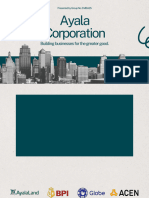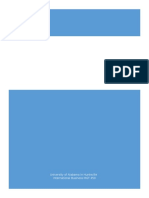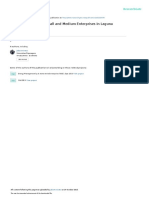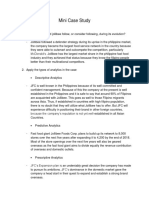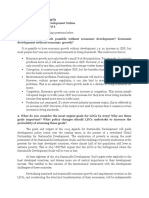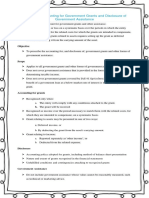0 ratings0% found this document useful (0 votes)
377 viewsReview Questions MISS TALA
Review Questions MISS TALA
Uploaded by
Angel Tugahan1. The document discusses various review questions related to international trade concepts like comparative advantage, balance of payments, protectionism, and trade barriers.
2. A balance of payments records all economic transactions between a country and the rest of the world. It indicates whether a country has a trade surplus or deficit and the overall status of its economy.
3. Protectionism refers to policies that restrict international trade to protect domestic industries. Common protectionist policies include tariffs, import quotas, subsidies, and product standards.
4. Countries implement trade barriers like tariffs to protect domestic industries from foreign competition and prevent job losses in important sectors of the economy.
Copyright:
© All Rights Reserved
Available Formats
Download as DOCX, PDF, TXT or read online from Scribd
Review Questions MISS TALA
Review Questions MISS TALA
Uploaded by
Angel Tugahan0 ratings0% found this document useful (0 votes)
377 views5 pages1. The document discusses various review questions related to international trade concepts like comparative advantage, balance of payments, protectionism, and trade barriers.
2. A balance of payments records all economic transactions between a country and the rest of the world. It indicates whether a country has a trade surplus or deficit and the overall status of its economy.
3. Protectionism refers to policies that restrict international trade to protect domestic industries. Common protectionist policies include tariffs, import quotas, subsidies, and product standards.
4. Countries implement trade barriers like tariffs to protect domestic industries from foreign competition and prevent job losses in important sectors of the economy.
Copyright
© © All Rights Reserved
Available Formats
DOCX, PDF, TXT or read online from Scribd
Share this document
Did you find this document useful?
Is this content inappropriate?
1. The document discusses various review questions related to international trade concepts like comparative advantage, balance of payments, protectionism, and trade barriers.
2. A balance of payments records all economic transactions between a country and the rest of the world. It indicates whether a country has a trade surplus or deficit and the overall status of its economy.
3. Protectionism refers to policies that restrict international trade to protect domestic industries. Common protectionist policies include tariffs, import quotas, subsidies, and product standards.
4. Countries implement trade barriers like tariffs to protect domestic industries from foreign competition and prevent job losses in important sectors of the economy.
Copyright:
© All Rights Reserved
Available Formats
Download as DOCX, PDF, TXT or read online from Scribd
Download as docx, pdf, or txt
0 ratings0% found this document useful (0 votes)
377 views5 pagesReview Questions MISS TALA
Review Questions MISS TALA
Uploaded by
Angel Tugahan1. The document discusses various review questions related to international trade concepts like comparative advantage, balance of payments, protectionism, and trade barriers.
2. A balance of payments records all economic transactions between a country and the rest of the world. It indicates whether a country has a trade surplus or deficit and the overall status of its economy.
3. Protectionism refers to policies that restrict international trade to protect domestic industries. Common protectionist policies include tariffs, import quotas, subsidies, and product standards.
4. Countries implement trade barriers like tariffs to protect domestic industries from foreign competition and prevent job losses in important sectors of the economy.
Copyright:
© All Rights Reserved
Available Formats
Download as DOCX, PDF, TXT or read online from Scribd
Download as docx, pdf, or txt
You are on page 1of 5
Review Questions
1. Differentiate the theory of absolutely advantage from the theory comparative
advantage.
The differences between the absolute and comparative advantage
theories are subtle. Absolute advantage looks at absolute productivity
differences while he comparative advantage looks at relative productivity
differences. However, both Smith and Ricardo agree that trade is neither
possible nor profitable when there are equal differences in costs.
2. What is balance payments?
The balance of payment is the statement that files all the transactions
between the entities, government anatomies, or individuals of one country
to another for a given period of time. All the transaction details are
mentioned in the statement, giving the authority a clear vision of the flow
of funds. After all, if the items are included in the statement, then the
inflow and the outflow of the fund should match. For a country, the
balance of payment specifies whether the country has an excess or
shortage of funds. It gives an indication of whether the country’s export is
more than its import or vice versa. A balance of payment is an essential
document or transaction in the finance department as it gives the status of
a country and its economy.
3. What is protectionism? How it is practiced by certain countries?
Protectionism is the practice of following protectionist trade policies. A
protectionist trade policy allows the government of a country to promote
domestic producers, and thereby boost the domestic production of goods
and services by imposing tariffs or otherwise limiting foreign goods and
services in the marketplace. Protectionism is a government-imposed trade
policy by which countries attempt to protect their industries and workers
from foreign competition. Protectionism is commonly implemented by the
imposition of tariffs, quotas on import and exports, product standard, and
government subsidies.
4. Why are there trade barriers?
Countries have trade barriers due to many reasons. Some of them are: To
protect domestic farmers from outside competition. To prevent loss of
unemployment which could occur due to loss of manufacturing in the
country. The most common barrier to trade is a tariff–a tax on imports.
Tariffs raise the price of imported goods relative to domestic goods (good
produced at home). Barriers to trade are often called “protection” because
their stated purpose is to shield or advance particular industries or
segments of an economy.
5. Based on the article “Bra Matters: From Feminism to Trade Wars”, what can an
exporting company do when faced with import quotas? Why do trade liberals
favor use of tariffs instead of import quotas?
The exporting country will set an export quota to adjust the number of
exports and improve export efficiency. The importing country will set
an import quota to limit the number of goods imported into the country, to
protect domestic production, resources and improve the balance of
payments. Only fools favor tariffs. In a globalized world economy, tariffs
cannot work. Just look at companies based in China. Trade liberals hate
both ideas. Technically either can be used [or rather, misused], but they
both make the situation worse. Maybe tariffs can be deemed less terrible
since the buyers and sellers have more freedom to act. When hit with
tariffs, most spent $500 to open a subsidiary in the USA or Canada or
Mexico or any of the dozens of countries not affected by the tariffs,
changed the letter heads, and kept on keeping on. If the goal is supporting
national businesses, the role of government is making sure the playing
field is level so national businesses can use their huge advantage of
location to compete and defeat, not corporate welfare or ANP idiots
meddling with far smarter businessmen.
6. Identify some imported products. What is the comparative advantage of the
countries from where these products are imported?
A country that produces a large amount of oil charges a local chemical
manufacturer less to purchase their product since it is cheaper to sell the
oil to them than export it overseas. Since the chemical manufacturer is
paying less for the materials they need to produce chemicals, they can sell
their finished products at a lower price than other countries. This makes
them more competitive in the chemical production industry. Therefore, this
company has a comparative advantage over other chemical production
companies.
A telecommunications company in the United States chooses to hire
customer service representatives from India because it is more cost
effective than opening a new call center in America. They use their
savings to provide cheaper internet and phone services than their
competitors. Even though their service may not be the best available,
customers choose to sign up for their internet and phone plans to save
money. In this example, providing a less expensive service outweighs
providing a quality service. Therefore, this telecommunications company
has a comparative advantage over other telecommunications companies
in the United States.
7. Select two provinces or regions in the country and find out the particular skill or
product they specialize in. Example is the woodcarving skill/ woodcraft in Paete,
Laguna. Investigate further if these products are already exported to/ available in
the international market.
Pineapple in Polomolok, Region 12
Banana
CITY / MUNICIPALITY KIND OF BANANA PLANTED BEARING (HAS)
DISTRICT I
Cardava 118
Alamada
Lacatan 77
Aleosan Cardava 180.5
Banisilan Cardava 27
Carmen Cardava 393.5
Kabacan Cardava 21
Libungan Cardava 205.5
Midsayap Cardava 351.2
Pigcawayan Cardava 550
Pikit Cardava 715.66
DISTRICT II
assorted (Private owned plantations) 200
Antipas
cavendish (SUMIFRU PHIL CORP) 320.1475
Arakan lakatan 73.5
lakatan 1260.2
Kidapawan City
cavendish (DOLE STANFILCO) 541.42
lakatan 1901.5
Magpet cavendish (DOLE STANFILCO) 84.69
cavendish (SUMIFRU PHIL CORP) 392.2004
lakatan 1221.61
Makilala
cavendish (DOLE STANFILCO) 1105.34
cardava 378.75
latundan 59.7
Matalam
lakatan 45.5
cavendish (SUMIFRU PHIL CORP) 1866.3675
M’lang cardava 395
Pres. Roxas cardava 381
lakatan 58
cavendish 177.1644
Tulunan cardava 655
TOTAL 13,756.4498
8. Get data the recent balance payment situation of the country. Assuming you are
a small trading company, how will the situation affect you?
Internet Exercise
1. Surf the web and find out how the anti-dumping law in the Philippines protects
Filipino exports against this business this business practice.
Dumping occurs when a country's businesses lower the sales price of
their exports to gain market share. By flooding the target export market
with drastically lowered prices, it often puts that nation's competing firms
out of business. Learn about the pros and cons of dumping, and what
measures nations take to prevent it. With dumping, a country's businesses
drop their product's price on the foreign market below what it would sell for
at home. They may even push the price below the actual cost to produce.
Then they raise the price once they've destroyed the other nation's
competition.
2. Surf the web and read thoroughly on the boycott of Danish products by the
Muslim world. What should the Danish government and exporters do to prevent
this trade war?
National Security Argument:
Each nation protects some industries to guard its national security. The
most obvious examples are weapons, aerospace, advanced electronics,
semiconductors, and strategic minerals (e.g., exotic ores used in jet
aircraft), etc. Protection for the sake of making available specific minerals
or resources does not appear to be an optimal poicy. A better alternative
is to stockpile such resources during peacetime when they are cheap.
You might also like
- Earth BuddyDocument36 pagesEarth BuddyMariia BalaganovaNo ratings yet
- Manuel S. Enverga University Foundation College of Business & Accountancy ScoreDocument2 pagesManuel S. Enverga University Foundation College of Business & Accountancy ScoreEjoyce KimNo ratings yet
- FM1 ActivityDocument4 pagesFM1 ActivityChieMae Benson Quinto100% (1)
- Quiz 2.1 - Individual Taxpayers and Quiz 3.1 - INCOME TAX ON CORPORATIONSDocument5 pagesQuiz 2.1 - Individual Taxpayers and Quiz 3.1 - INCOME TAX ON CORPORATIONSHunternotNo ratings yet
- PACEDocument5 pagesPACEJoanne DawangNo ratings yet
- Case Analysis On Ayala CorporationDocument45 pagesCase Analysis On Ayala CorporationeagonzalesdetorresNo ratings yet
- About AboitizDocument5 pagesAbout AboitizDayanara VillanuevaNo ratings yet
- Operations MGT Module #8Document3 pagesOperations MGT Module #8Jude VicenteNo ratings yet
- Concept MapDocument1 pageConcept MapLOUCHELL TERESE DANONo ratings yet
- Module 1 - No ActivitiesDocument6 pagesModule 1 - No ActivitiesLeah Jane DamegNo ratings yet
- 08 ELMS Review 1Document2 pages08 ELMS Review 1Cj MoontonNo ratings yet
- Corporation ActivityDocument4 pagesCorporation ActivityLFGS FinalsNo ratings yet
- Emperador IncDocument3 pagesEmperador IncRena Jocelle Nalzaro0% (1)
- Jeric Risma - Module 4 ApplicationDocument8 pagesJeric Risma - Module 4 ApplicationJeric RismaNo ratings yet
- Open Case Exercises - AfricaDocument4 pagesOpen Case Exercises - AfricaRoxana MoldovanNo ratings yet
- Reflection-Paper Chapter 1 International ManagementDocument2 pagesReflection-Paper Chapter 1 International ManagementJouhara G. San JuanNo ratings yet
- Globe TelecomDocument8 pagesGlobe TelecomLesterAntoniDeGuzmanNo ratings yet
- Ulo Week 4-5Document10 pagesUlo Week 4-5Nicolas ArsagaNo ratings yet
- Clean Clothes Corner Laundry Excel-11OCTDocument5 pagesClean Clothes Corner Laundry Excel-11OCTshannel jackson100% (1)
- PLDT Company Portfolio AnalysisDocument13 pagesPLDT Company Portfolio AnalysisMary Bernadette VillaluzNo ratings yet
- PopulationDocument13 pagesPopulationMaria Hannah GallanoNo ratings yet
- Art and OffenseDocument3 pagesArt and OffenseShane Pajabera100% (1)
- Group 5 Reporter San Miguel CaseDocument8 pagesGroup 5 Reporter San Miguel CaseArlen Mae RayosNo ratings yet
- Chapter 2Document10 pagesChapter 2Ruiz, CherryjaneNo ratings yet
- The Globalization of Trades of Goods and ServicesDocument2 pagesThe Globalization of Trades of Goods and ServicesCj buenNo ratings yet
- Implications Overpriced Goods To The Customers of The Selected Sari-Sari Store Within Upper Bicutan Taguig CityDocument10 pagesImplications Overpriced Goods To The Customers of The Selected Sari-Sari Store Within Upper Bicutan Taguig CityAbedzhiaNo ratings yet
- Alorica FinalDocument7 pagesAlorica FinalfanchasticommsNo ratings yet
- Strategic Asset ManagementDocument5 pagesStrategic Asset ManagementJanice JalaliNo ratings yet
- RIO FLORENDO - YOUR HARDWARE PROBLEM - Jenny Boo, 12 Dwigh MoodyDocument2 pagesRIO FLORENDO - YOUR HARDWARE PROBLEM - Jenny Boo, 12 Dwigh MoodyJenny BooNo ratings yet
- Hansen - Chapter 06 Process Costing 1st EditionDocument57 pagesHansen - Chapter 06 Process Costing 1st EditionLyceen PaquitNo ratings yet
- Situation Analysis of Small and Medium EnterprisesDocument26 pagesSituation Analysis of Small and Medium EnterprisesGabriel BernalNo ratings yet
- Mini Case StudyDocument2 pagesMini Case StudyRainier TarpinNo ratings yet
- Case StudyDocument3 pagesCase Studyshenshen bitara100% (1)
- The Only Way To Know Rizal Is To Read Rizal by Ambeth Ocampo Reaction PaperDocument1 pageThe Only Way To Know Rizal Is To Read Rizal by Ambeth Ocampo Reaction PapergenesisNo ratings yet
- The Strength and Weaknesses of Each The Competitor's Products and ServicesDocument8 pagesThe Strength and Weaknesses of Each The Competitor's Products and ServicesEden Dela CruzNo ratings yet
- Case Study On Google S Steep Learning Curve in ChinaDocument3 pagesCase Study On Google S Steep Learning Curve in ChinaKutoo BayNo ratings yet
- Procter & Gamble (P&G) (Danigelis, 2018) : Names: Giryl Jean S. Fernandez Section: Bsba-302B Date:03/04/22Document2 pagesProcter & Gamble (P&G) (Danigelis, 2018) : Names: Giryl Jean S. Fernandez Section: Bsba-302B Date:03/04/22Rea Mae Bagtasos CagandeNo ratings yet
- Microsoft Word UNIT EXAMS ANSWER KEYDocument7 pagesMicrosoft Word UNIT EXAMS ANSWER KEYCharles GalidoNo ratings yet
- Chapter 3Document20 pagesChapter 3crackheads philippinesNo ratings yet
- Activity 2 ECODocument2 pagesActivity 2 ECOEugene AlipioNo ratings yet
- Impact of Financial Management To Small Enterprises in San Jose CityDocument27 pagesImpact of Financial Management To Small Enterprises in San Jose Cityrovelyn CabicoNo ratings yet
- SM Investment CORPDocument2 pagesSM Investment CORPJoneric RamosNo ratings yet
- Instructional Module: IM No. INTL 1-1STSEM-2020-2021Document3 pagesInstructional Module: IM No. INTL 1-1STSEM-2020-2021Frany IlardeNo ratings yet
- Patrice R. Barquilla 12 Gandionco Business Finance CHAPTER 2 ASSIGNMENTDocument12 pagesPatrice R. Barquilla 12 Gandionco Business Finance CHAPTER 2 ASSIGNMENTJohnrick RabaraNo ratings yet
- Chapter 7 The Financial EnvironmentDocument25 pagesChapter 7 The Financial EnvironmentEunice NunezNo ratings yet
- Midterm Project URC Group 3FM2Document14 pagesMidterm Project URC Group 3FM2YunieNo ratings yet
- Cases: Case 2. Angel Ball Construction Supply: PretendDocument2 pagesCases: Case 2. Angel Ball Construction Supply: PretendArzelJoyA.VillanuevaNo ratings yet
- Final Feasibility Study 1 1Document69 pagesFinal Feasibility Study 1 1Donna Lee Bug-atanNo ratings yet
- Lrizal Poem Analysis Group PDFDocument6 pagesLrizal Poem Analysis Group PDFZXARIS VALERIONo ratings yet
- Taxation Chap 1Document16 pagesTaxation Chap 1Merylle Shayne GustiloNo ratings yet
- I. Physically Impossible ConditionDocument8 pagesI. Physically Impossible Conditionleshz zynNo ratings yet
- Activity No. 1: Interpreting The 6 P'S: Name: Score: Year/Block: 2 Year/ DateDocument4 pagesActivity No. 1: Interpreting The 6 P'S: Name: Score: Year/Block: 2 Year/ DateJayson Caranza100% (1)
- PAS 20 - Accounting For Government Grants and Disclosure of Government AssistanceDocument1 pagePAS 20 - Accounting For Government Grants and Disclosure of Government AssistanceBirdWin WinNo ratings yet
- 05 Task Performance - ARG: RequirementsDocument3 pages05 Task Performance - ARG: Requirementssungit comiaNo ratings yet
- Chapter 10 INTERNATIONAL BUSINESS AND TRADEDocument5 pagesChapter 10 INTERNATIONAL BUSINESS AND TRADEgian reyesNo ratings yet
- PLDT Inc. SWOT Analysis Strengths of PLDT IncDocument6 pagesPLDT Inc. SWOT Analysis Strengths of PLDT IncEricca Joyce AndradaNo ratings yet
- SRGG Group 1Document20 pagesSRGG Group 1joshuaNo ratings yet
- Case Analysis of Banana TimeDocument2 pagesCase Analysis of Banana TimePoli Abrenica100% (1)
- Vision MissionDocument2 pagesVision MissionMonina AmanoNo ratings yet
- Trade Fairs 2018 Report RevisedDocument8 pagesTrade Fairs 2018 Report RevisedJenifer RalosoNo ratings yet
- Advertising: Team Abhijeet Kumar Aditya Kedia Abhishek Miglani Anuj (76) Harmanj Jeet Singh (77) Vineet RanjanDocument32 pagesAdvertising: Team Abhijeet Kumar Aditya Kedia Abhishek Miglani Anuj (76) Harmanj Jeet Singh (77) Vineet Ranjanvineetranjan337No ratings yet
- Sales PPT - GRP 3Document14 pagesSales PPT - GRP 321324jesikaNo ratings yet
- Sample CVFormat 2Document2 pagesSample CVFormat 2ranajit dwibediNo ratings yet
- Download Full (Original PDF) THINK Marketing 3rd Edition by Keith J. Tuckwell PDF All ChaptersDocument56 pagesDownload Full (Original PDF) THINK Marketing 3rd Edition by Keith J. Tuckwell PDF All Chaptersodaisacayer100% (6)
- Warehouse PlanningDocument3 pagesWarehouse PlanningSoorajKrishnanNo ratings yet
- StratCostMgt Unit 1 Module3Document4 pagesStratCostMgt Unit 1 Module3Kim MasapolNo ratings yet
- CAPE AccountingDocument10 pagesCAPE Accountingget thosebooksNo ratings yet
- Advertising BudgetDocument41 pagesAdvertising BudgetMonika SharmaNo ratings yet
- Sample - Indonesia Freight and Logistics Market (2021-2026) - Mordor Intelligence1625641663523Document67 pagesSample - Indonesia Freight and Logistics Market (2021-2026) - Mordor Intelligence1625641663523LilyNo ratings yet
- 2021-TIN-3 TLE Marketing Funnel DWIDocument22 pages2021-TIN-3 TLE Marketing Funnel DWIMuhammad Arif DarmawanNo ratings yet
- Inala - C-Level CommentsDocument2 pagesInala - C-Level CommentsMaria LourdesNo ratings yet
- IBM IT Service Management in An Uncertain EconomyDocument16 pagesIBM IT Service Management in An Uncertain Economymunia76No ratings yet
- Design of Butterfly Valve Components IJERTV5IS020242Document7 pagesDesign of Butterfly Valve Components IJERTV5IS020242shashibagewadi100% (1)
- Discount Sheet 01Document19 pagesDiscount Sheet 01kumarjatinmvNo ratings yet
- Oracle Customer Data Hub Implementation Concepts and StrategiesDocument125 pagesOracle Customer Data Hub Implementation Concepts and StrategiesMiloni MehtaNo ratings yet
- Exp 0002Document28 pagesExp 0002nag_gvnrNo ratings yet
- XPO IR Presentation July 2020r ENGDocument108 pagesXPO IR Presentation July 2020r ENGshivshankar HondeNo ratings yet
- CRM PPTsDocument43 pagesCRM PPTsNeha Garg100% (1)
- Lean & Environment Case Study: Columbia Paint & CoatingsDocument21 pagesLean & Environment Case Study: Columbia Paint & CoatingsRaja ManiNo ratings yet
- Marketing Submission 2Document6 pagesMarketing Submission 2kaku bundelaNo ratings yet
- Report DLDocument4 pagesReport DLexamplecgNo ratings yet
- E-Commerce and Customs Management in Supply ChainDocument150 pagesE-Commerce and Customs Management in Supply ChainNikki EstradaNo ratings yet
- Mohammed Al Qureshi: ContactDocument4 pagesMohammed Al Qureshi: ContactDigitize GroupNo ratings yet
- Nguyen Dieu Linh Adv - PJ1Document24 pagesNguyen Dieu Linh Adv - PJ1long hoangNo ratings yet
- Aguinaldo Blend CoffeeDocument50 pagesAguinaldo Blend CoffeeLENARD JOSH INGALLANo ratings yet
- Case Study On Master BudgetDocument8 pagesCase Study On Master BudgetMusaib Ansari100% (1)
- LSS Final - Report - TemplateDocument9 pagesLSS Final - Report - TemplateEdNo ratings yet
- Activity 1 Week 2 - AMPERADocument9 pagesActivity 1 Week 2 - AMPERAMuharromi Maya AgustinNo ratings yet
- Applications of Advanced Analytics in Mining SaferDocument15 pagesApplications of Advanced Analytics in Mining SaferjellyonNo ratings yet





